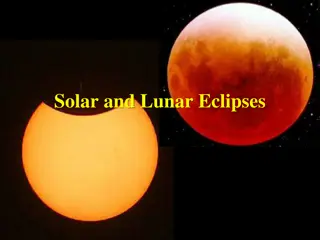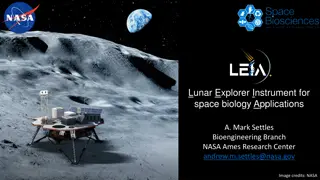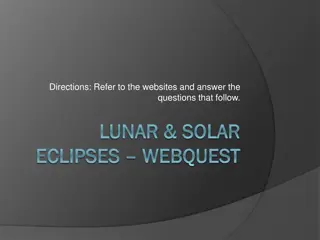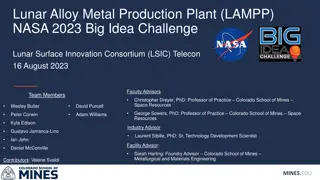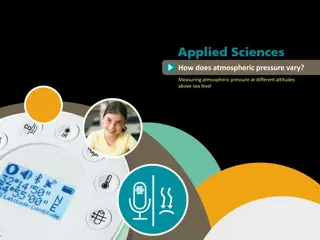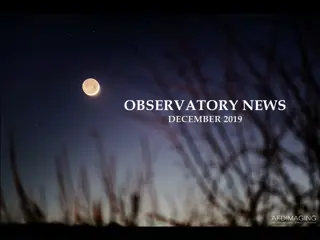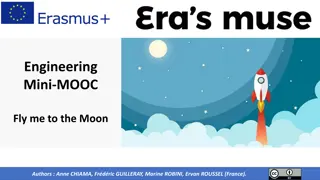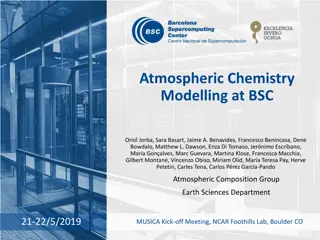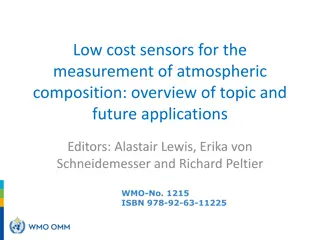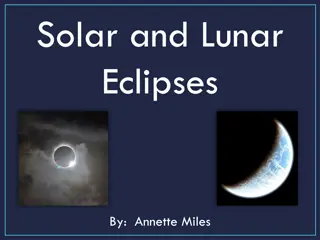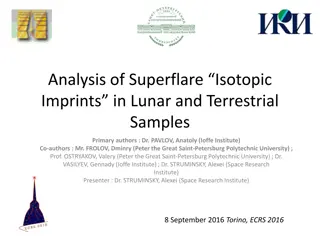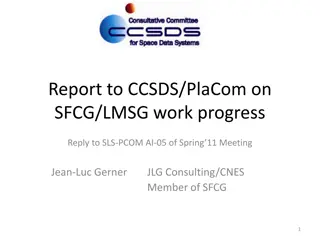Lunar Atmospheric Composition: LACE Experiment Insights
Discover the Lunar Atmospheric Composition Experiment (LACE) conducted by Katie Pazamickas during Apollo 17. Explore how LACE works, data analysis, AMU calculations, daily graphs, and insights into moonquakes and meteoroid impacts on the moon's atmosphere.
Uploaded on Apr 12, 2025 | 0 Views
Download Presentation

Please find below an Image/Link to download the presentation.
The content on the website is provided AS IS for your information and personal use only. It may not be sold, licensed, or shared on other websites without obtaining consent from the author.If you encounter any issues during the download, it is possible that the publisher has removed the file from their server.
You are allowed to download the files provided on this website for personal or commercial use, subject to the condition that they are used lawfully. All files are the property of their respective owners.
The content on the website is provided AS IS for your information and personal use only. It may not be sold, licensed, or shared on other websites without obtaining consent from the author.
E N D
Presentation Transcript
Winter 2022 Orientation Session Welcome to the Department of Electrical and Computer Engineering!
Welcome to GCS and ECE Leadership Dr. Mourad Debbabi (Dean) Dr. Yousef Shayan (Chair) Introduction to Programs Overview of ECE U/G programs (Dr. Wahab Hamou-Lhadj, Associate Chair, U/G Studies) ELEC program (Dr. M. Zahangir Kabir, U/G Program Director, ELEC) COEN program (Dr. Bahareh Goodarzi, U/G Program Director, COEN) Administrative Information Academic Regulations (Ms. Tina De Stefano, U/G Program Assistant) Campus Resources (Ms. Tina De Stefano) Labs Remote and in-person labs (Mr. Dmitry Rozhdestvenskiy, Engineer in Residence) 2
Overview of ECE programs U/G programs offered: B.Eng in Computer Engineering B.Eng in Electrical Engineering Information sources: ECE website > Students > Undergraduate students http://www.concordia.ca/eceugrad Undergraduate Calendar: https://www.concordia.ca/academics/undergraduate/c alendar/current.html 3
Program Structure Total: 120 credits (CEGEP graduates) + additional credits required for other students Engineering Core (30.5 credits) Program (COEN / ELEC) Core Technical Electives More info: U/G Calendar, Sec. 71.10 to 71.30. 4
ELEC Program Total: 120 credits (CEGEP graduate) + additional credits required for other students Engineering Core (30.5 credits) 71.20.5. ELEC (General stream) Core (70 credits), Electives (19.5 credits), in final year Course sequence: https://www.concordia.ca/ginacody/electrical-computer- eng/programs/electrical-eng/bachelor/course-sequences.html Students can take any courses during study term (provided prerequisites are satisfied). 5
ELEC Program: Elective Groups Elective Groups Telecommunication Networks and Signal Processing Microdevices, Electronics and VLSI Power and Renewable Energy Systems Controls, Robotics and Avionics Waves and Electromagnetics Computer Systems Biological and Biomedical Engineering More info: U/G Calendar, Sec. 71.30.1 6
COEN Program Total: 120 credits (CEGEP graduate) + additional credits required for other students Engineering Core (27.5 credits) + General Elective (3 credits) Computer Engineering Core (72.50 credits) Electives (17 credits) 7
COEN Electives Computer Engineering Electives Hardware/Electronics/VLSI Software and System Design Biological and Biomedical Engineering Computer Science and Software Engineering Telecommunications, Networking and Signal Processing Control, Robotics and Avionics Other List of courses for each category: Computer Engineering Options 8
Co-op and Mandatory Work Term Students in ECE programs are required to be either in the CO- OP program or C-Edge (Career Edge) program. Co-op students: 3 work terms 2.5 minimum GPA (Also required to stay in Coop) 12 credits minimum per term Complete ENCS 282 before the first work term Can not start and end the course plan with a work term To apply: Fill out a form Propose a sequence https://users.encs.concordia.ca/~mariaf/ECE_Coop/ECE_COOP.pdf 9
Mandatory Work Term (Cont.) C-Edge: 1 work term C-Edge allows for one work terms for non-co-op students With this program, undergraduate students in eligible programs can obtain one, relevant, paid internship to better your transition to the workplace. Eligibility: Minimum of 60 credits of 120 credit program Work terms are assigned by the department in the 3rd year of studies. Students may make a request to change the work term to the Undergraduate Program Director. https://www.concordia.ca/academics/co-op/programs/career- edge.html https://users.encs.concordia.ca/~mariaf/C-Edge/C-Edge.pdf 10
Some academic regulations The last day for course changes (without any penalty) is called the add/drop date or the Did Not Enter (DNE) date. You can discontinue courses after DNE date. In this case, You must pay the fees and the course will remain on your record with the notation DISC or discontinued . All 200-level courses within the program which are prerequisites for other courses must be completed with a C- or higher. All students in engineering programs must complete all 200-level courses in their programs prior to commencing courses at the 400-level.


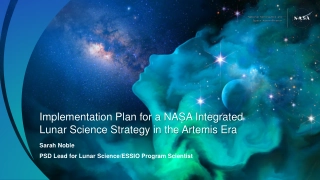
![get⚡[PDF]❤ Building Habitats on the Moon: Engineering Approaches to Lunar Settle](/thumb/21624/get-pdf-building-habitats-on-the-moon-engineering-approaches-to-lunar-settle.jpg)
